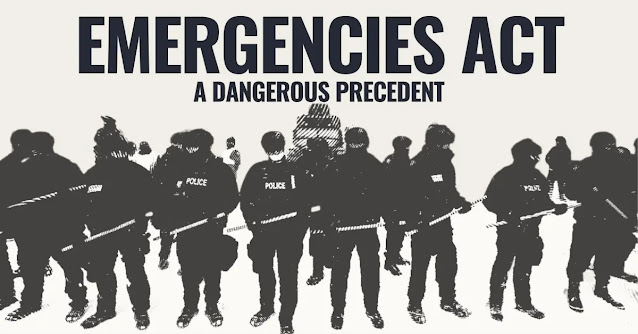What Happens Next?
- jim Young
“There may be times when we are powerless to prevent injustice… but there must never be a time when we fail to protest.” - Elie Wiesel
Whichever side of the fence you’re on in the Freedom Convoy Protest of 2022, the fact remains that the Federal Court of Canada has ruled that Trudeau and his Government violated the Canadian Charter of Rights and Freedoms when they invoked the Emergencies Act on February 14, 2022 in Ottawa.
Passed into law in 1988 the Emergencies Act” had never previously been used under that name. The Emergencies Act replaced the War Measures Act which had been adopted in 1914 shortly after the beginning of World War I.
The War Measures Act had been invoked only 3 times. Once during World War I, once during World War II and lastly on October 17th, 1970 when Justin Trudeau’s father Prime Minister Pierre Trudeau invoked it, suspending civil liberties during the FLQ crisis. This is the only time the War Measures Act had been put in place in peacetime.
Similar to the War Measures Act, the intent of the Emergencies Act is to enable the government to take extraordinary but temporary measures when needed to protect the public in emergency situations. Apparently, according to the most recent ruling, it wasn’t needed against the Freedom Convoy Protest.
To qualify as a “public emergency” there must be a threat to the security of Canada as outlined by CSIS.
2(c): “activities within or relating to Canada directed toward or in support of the
threat or use of acts of serious violence against persons or property for the
purpose of achieving a political, religious or ideological objective within Canada
or a foreign state.” The threat cannot be “lawful advocacy, protest or dissent,”
unless it is carried out in conjunction with one of the four “threats to the security
of Canada,” defined in s. 2.
Making the claim that invoking the Emergencies Act was unconstitutional by that definition, the Canadian Civil Liberties Association (CCLA), the Canadian Constitution Foundation (CCF) and others took the matter to court last year.
In the end, Justice Richard G. Mosley recently ruled that invoking the Emergencies Act was unreasonable, unjustified, unintelligent and lacked transparency.
So what happens next? Well of course Trudeau will file an appeal with the Supreme Court of Canada to try to get this ruling overturned, but barring the success of that… what’s really next?
Ultimately the most important outcome of this will be to ensure it doesn’t happen again. Once bitten, twice shy as the old saying goes. The rights of Canadians to hold a peaceful protest need to be ensured.
Beyond that however, what’s in store for all those involved?
According to the Canadian Charter of Rights and Freedoms under the heading Chartapedia,
Provision
24.(1) Anyone whose rights or freedoms, as guaranteed by this Charter, have
been infringed or denied may apply to a court of competent jurisdiction to obtain
such remedy as the court considers appropriate and just in the circumstances.
If I am interpreting this correctly, anyone involved in the protests whose rights were infringed upon should be entitled to apply to receive a “remedy” as in “having the situation rectified”.
But what does that really mean? It could be argued the situation was “rectified” just 9 days later when the Emergencies Act was revoked after having been put in place.
But that would be like saying the assault was rectified when the assailant quit beating you.
I would hope in this case it would mean all charges dropped, all fines reversed, all items previously confiscated returned… that kind of thing. I would hope it would even cover court costs for the plaintiffs, but there’s no direct mention of any of that.
Will the protesters be compensated for wrongful incarceration? Lost wages from being prevented from working?
General (Non-Pecuniary) Damages, Pecuniary Damages, Nominal Damages, Compensatory (or Actual) Damages, Punitive (or Exemplary) Damages, Aggravated Damages, Liquidated Damages are all types of damages typically awarded in most kinds of litigation.
Who will be responsible for the payout? You can bet it won’t be Trudeau or even any of the members of the government that were all part of the scheme. It will be you and I - the taxpayers.
And what about punitive damages? Trudeau and his cronies broke the law when they invoked the Emergencies Act. We’re not talking about speeding ticket laws here. This was a biggie. It was a very important, fundamental law that they broke - the Canadian Charter of Rights and Freedoms. What’s the penalty for that? Dismissal from their positions? I would think something like this should be a criminal offense. Does it involve jail time? Or just a fine? And if we’re back to a fine… you know who’s paying.
- 30 -




Comments
Post a Comment